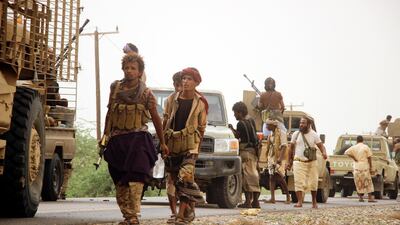One of the inevitabilities of conflict is a war economy as groups with sway over funds gain critical advantage on the battlefield.
That fundamental dynamic is critically overlooked in Yemen, in particular because the country’s dependence on humanitarian aid is so far-reaching.
Even those who subscribe to dire warnings of the impact of the Hodeidah offensive acknowledge that the current stranglehold exercised by the Houthis over the regional port is actively perpetuating the crisis affecting millions.
The Arab coalition has repeatedly stressed that the continuing stalemate is unacceptable. Just leaving the Yemenis to suffer under the status quo is not an option.
Alistair Burt, the British minister for the Middle East, acknowledged at a talk on Thursday the risks of doing nothing. The danger is that Yemeni suffering is being artificially perpetuated. The “exploitation” of the economic situation by the Houthis was, he said, “a major cause” of prolonged conflict.
David Miliband, a former British foreign secretary who now heads the International Rescue Committee, has observed that Iran has intervened in Yemen for “relatively little money” but at great cost to the country’s neighbours.
Alongside his outright criticism of events lies a critique of the set-up that creates a bottleneck for aid.
The trap that faces Yemen is that almost three-quarters of humanitarian aid flows through Hodeidah. Yet control of the port has greatly facilitated the illicit shipments of missiles and other arms for Houthis to attack both other factions and Yemen's neighbours.
Aid shipments also generate great wealth for Houthis commanders and fighters, money that comes from bribes, informal taxes and siphoning off cargo. Estimates of the revenues that flow from these activities are impossible to verify but run into tens of millions of dollars every month.
There is broad acknowledgement – that relatively rarely makes it into the headlines – that the plight of the Yemeni population is made much worse by rebel control of Hodeidah and its supply routes to the most populous part of the country.
More than 10 years ago, warnings that Yemen’s water table would one day be unable to support its 30 million-strong population were accepted by the UN. That reality has been accelerated.
Mr Miliband also made the fundamental point that no country can function solely on humanitarian aid. The Houthis' takeover has crippled Yemen’s commercial economy and a nation that was already on the edge of viability is plunging into a manmade nightmare.
The paradoxical effect is that the controller of the gateway port gains from the collapse of wider economic activity.
Fresh thinking on the nature of conflict has not been applied to Yemen. The remarks by Mr Burt last week came in the context of an official British study on bargaining dynamics affecting conflict resolution.
A multi-pronged exercise by the UK government's Stabilisation Unit placed control of resources alongside better-recognised factors such as tribal customs, factional loyalty and governmental institutions.
Most historical conflicts have ended as a result of military victory but since the end of the Cold War, political agreements have been more common than armistices.
Bargaining on resources is crucial to ending a conflict. Ending wars is not just about reducing violence and building confidence in power-sharing.
The allocation of economic spoils is often an afterthought in places like Yemen. In other conflicts, it is perhaps clearer that state capture is a critical issue; think of the Assad regime’s monopoly on Syria’s economy.
Just this week, the highest European court upheld an asset freeze on Rami Makhlouf, the businessman cousin of Bashar Al Assad, who was deemed a key pillar of support for the Syrian regime.
Apply this thinking to Yemen and it becomes clear that economic factors make up a big part of the ongoing war. To return to my opening salvo, the Houthis' advantage in Yemen lies in exploiting the infrastructure and territory under their control.
While western politicians and activists make arguments and pleas based on humanitarian concerns, selfish economic interests are far more powerful on the ground.
The Houthi high command has little incentive to enter UN-led talks that aim to secure free flows of food and supplies to the Yemeni population – still less their Iranian allies, who are doing it on the cheap.
Negotiations would target a lucrative stranglehold. Meanwhile, Iranian arms supplies would dry up if illicit imports were caught in independent monitoring and verification mechanisms.
Military pressure is a legitimate tool to use against the deadlock. The UN-led political process has been revived but is not yet producing results. Until it does so, it cannot be a good option to sit and wait for a change of heart.


